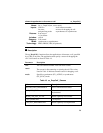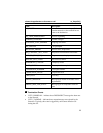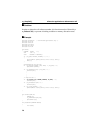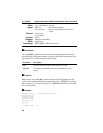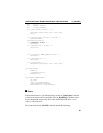
cc_DropCall( ) allows the application to disconnect a call
78
!
! !
!
Cautions
In order to release the call reference number, this function must be followed by a
cc_ReleaseCall( ) to prevent a blocking condition or memory allocation errors.
!
! !
!
Example
#include <windows.h> /* For Windows applications only */
#include <stdio.h>
#include <errno.h>
#include "srllib.h"
#include "dtilib.h"
#include "cclib.h"
void main()
{
LINEDEV devhdl = 0;
CRN crn = 0;
char *devname = "dtiB1T1";
if ( cc_Open( &devhdl, devname,0)<0)
{
printf("Error opening device: errno = %d\n", errno);
exit(1);
}
printf("Waiting for call\n");
if ( cc_WaitCall(devhdl, &crn, NULL, -1, EV_SYNC)<0)
procdevfail(devhdl);
if ( cc_AnswerCall(crn, 0, EV_SYNC)<0)
callfail(crn);
.
.
.
.
.
/* Drop the call */
if ( cc_DropCall(crn, NORMAL_CLEARING, EV_SYNC) <0)
callfail(crn);
if ( cc_ReleaseCall(crn)<0)
callfail(crn);
if ( cc_Close( devhdl)<0)
printf("Error closing device, errno = %d\n", errno);
}
int callfail(CRN crn)
{
LINEDEV ld;
cc_CRN2LineDev(crn,&ld);
procdevfail(ld);
}
int procdevfail(LINEDEV handle)
{
int reason;








